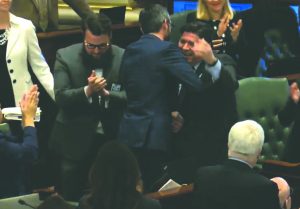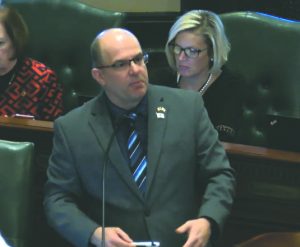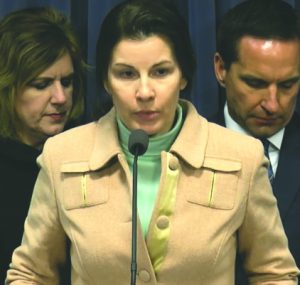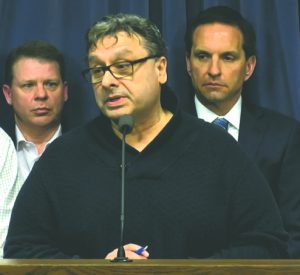Democrats hike state’s minimum wage to $15 per hour
By Kevin Beese Staff Reporter — February 18, 2019
Gov. J.B. Pritzker hugs state Rep. Will Guzzardi (D-Chicago) on the state House floor Thursday after House members approved raising the state’s minimum wage to $15 per hour by 2025. Guzzardi was the chief sponsor of the measure in the House. (BlueRoomStream.com)
Illinois is just a signature away from a $15-per-hour minimum wage.
With state House passage of the proposal on Thursday and the measure already clearing the state Senate, the legislation now only needs the signature of Gov. J.B. Pritzker. The governor has said he will sign the legislation and was even on the state House floor Thursday to congratulate state Rep. Will Guzzardi (D-Chicago), chief sponsor of the measure in the House, on the bill’s passage.
The increase will be phased-in over six years, reaching $15 per hour in 2025, and will include tax credits for small businesses.
“There’s only one way to stop being poor. There’s only one way,” Guzzardi said. “It’s not going to college or to pick your chin up or to pick yourself up by your bootstraps — not to disparage any of those things — but that’s not a way to stop being poor.
“The only way to stop being poor is to have more money. The working poor in our state are going to have more money. We will treat their labor with the dignity and respect it deserves. We will allow them to provide a better standard of living for themselves and their families.”
The measure passed the House on a partisan vote with no Republicans voting for the measure.
State Rep. Delia Ramirez (D-Chicago) said she was proud to cast her vote in support of increasing the minimum wage in Illinois.
“This bill is an important step toward ensuring a living wage for all working people across our state,” said Ramirez, a chief co-sponsor of the legislation.
She said as the former director of a social service agency for the homeless, she worked with many individuals for whom living at the current minimum wage meant they were either homeless or at risk of becoming homeless.
“This is unacceptable,” Ramirez said. “All workers deserve to be treated with dignity and respect, and for their work to be valued.”
State Rep. Rob Martwick (D-Chicago) said the argument regarding the minimum wage increase broke down to theory verses data. He said by taking the lowest-paid workers and giving them a higher wage, the state’s economic picture would improve.
“Those are the people who use every disposable dollar so there is an infusion of money in the economy,” Martwick said. “More money going to them means they will spend and create more demand in the economy.”
He also said by full-time minimum wage workers making as much as $30,000 per year, many of them could be removed from the social service rolls on which they currently find themselves.
“People being able to lift themselves out of poverty will cost the state less,” Martwick said.

State Rep. Mark Batinick (R-Plainfield) questions the impact and the long-term effects of the proposed minimum wage hike. “We are in unchartered territory, and for a state like Illinois, where we have so many existing challenges impeding our financial success, doing something unprecedented is simply bad policy,” Batinick said. (BlueRoomStream.com)
Martwick pointed out that Mark Doussard, a professor at the University of Illinois, told House members that voluminous research shows that increasing the minimum wage has no impact on unemployment rates or job growth.
“People losing their jobs because of a higher minimum wage is a theory, but it is not supported by the data,” Martwick said.
He noted many of the same arguments against the state minimum wage hike where uttered when Chicago was considering raising the minimum wage for workers within the city limits. He noted that Chicago is now at $12 per hour for workers while the rest of the state is at an $8.25 per hour minimum wage and nearby Indiana is at a $7.50 per hour minimum
“Yet, Chicago has had a boom to its economy,” Martwick said. “The labor market is at its lowest in terms of unemployment.”
Martwick said he was proud that in just three weeks, the state Legislature has “accomplished something historic, something big.”
Four Democrats voted against the hike in the minimum wage. They were: Monica Bristow of Godfrey, Terrra Costa Howard of Glen Ellyn, Jerry Costello of Smithton and Mary Edly-Allen of Libertyville.
State Rep. Stephanie Kifowit (D-Aurora) voted “present.” State Rep. Deanne Mazzochi (R-Elmhurst) was absent.
House Republicans unanimously opposed the minimum wage hike.
During the debate Thursday, state Rep. Mark Batinick (R-Plainfield) heavily bashed the measure. Batinick questioned the impact and long-term effects of the proposal, and balked that neither concern could be answered by the bill’s sponsor.
“No studies have been done on the long-term effects of dramatic increases in minimum wage,” said Batinick. “We are in uncharted territory, and for a state like Illinois, where we have so many existing challenges impeding our financial success, doing something unprecedented is simply bad policy.”
Batinick’s concern with the proposal involves the unknown effects the increase will have on businesses statewide, including those in southern Illinois who will experience an 82 percent increase in wages.
“We cannot predict how this will affect our state. What we do have is an example in the city of Chicago, where the effects of their minimum wage increase from 2014 are coming to light,” Batinick said. “Their population is declining and businesses are leaving the city for lower costs in the suburbs — or other states. Those are facts. Something that so clearly has not been successful in one city is now going to be amplified in our entire state. This is absurd and will put any businesses who are already struggling in serious trouble.”
Assistant House Minority Leader Norine Hammond (R-Emmet Township) noted that the wage hike will cost Illinois taxpayers nearly $1.1 billion — just for state workers’ pay raises.
Hammond stated, “The cost, once fully implemented, to Western Illinois University is over $4 million and the total cost to our already strapped university system is $112 million in increased spending. Community colleges and K-12 schools will see drastic increased employment costs as well.”
She added, “Our bordering states, Missouri and Iowa, pay a dollar less per hour in minimum wage than Illinois currently pays. An 82 percent increase in our wages will lead to outsourcing for cheaper materials and/or labor. It will also send people across state lines to buy items at a price that the small business owners in Illinois simply can no longer compete with.”
Hammond said the change is expected to take a massive toll on businesses, nonprofits and government agencies as well. Estimates placed the cost of the increase at more than $1 billion for direct state employees. Universities would face tens of millions of dollars in new costs with the potential for thousands of student employee layoffs, Hammond said. According to several schools, the hike will likely result in layoffs for teachers’ aides and other positions that will negatively affect in-classroom learning and/or create pressure to raise property taxes, the representative said. In addition, a number of social service providers have said they may be forced to lay off staff or cut services, according to Hammond.
She said business groups wanted to voice their concern for an 82 percent increase but felt ignored during discussions. They, along with Republicans from the House and Senate, were pushing for a regionalization amendment in the House that would allow for lower wages outside Chicago. Unfortunately, Hammond said, no amendment was added, at Governor Pritzker’s urging.
kbeese@chronicleillinois.com
Business owners fearful of wage hike
By Kevin Beese
Staff reporter
Mike Monseur wonders just how much people will be willing to pay for a pizza once Illinois’ minimum wage rises to $15 per hour.
“You can only charge so much for a product and when you reach that level they stop buying,” said the president of Godfather’s Pizza in Springfield. “And what happens? The business goes out.”

Karen Conn, president and CEO of Conn’s Hospital Group in Peoria and Springfield, said that businesses in other parts of the state don’t have the economic benefits of metro Chicago to support a $15-per-hour minimum wage. (BlueRoomStream.com)
He said he would like to continue to invest in his community, but that the state government has forced him to make other choices.
Monseur said he is worried to have Gov. J.B. Pritzker sign the wage hike, increasing the state’s minimum wage to $15 per hour over a six-year phase-in.
“I am scared for me as a business owner. I am scared for my community,” Monseur said. “I’m scared for my employees and our state.”
The Illinois Retail Merchants Association had pitched a regionalized approach to the minimum wage, noting that Central and Southern Illinois do not have the same cost of living as Chicago. However, that plea fell on deaf ears and members of the state House approved the legislation Thursday.
Rob Karr, president and CEO of the Illinois Retail Merchants Association, said business owners recognize the need for a hike in the minimum wage, but said the drastic impact the move to $15 per hour will have on businesses outside of the Chicago area will be hard to weather.
Karr said his members would support an hourly minimum wage that caps at $15 for Chicago, $13 for the suburbs and $11 for central and southern Illinois. He said business owners would also accept the “New York approach,” where all parts of the state end up at the same minimum wage rate, but with less urban areas phasing it in over a longer period of time.
“It’s going to be devastating, particularly for the suburban and Downstate communities,’” Karr said of the legislation as it is written with a statewide $15-per-hour minimum wage.
Karr said it is inappropriate to treat the rest of the state as if it has the same strengths of Chicago.
“It is simply illogical,” Karr said. “No one else has 55 million-plus visitors a year. No one else in the state of Illinois has millions of people commuting to their city center every day, spending millions on goods and services; and no one else has the concentration of business or wealth, frankly. No one else has these dynamics.”

Mike Monseur, president of Godfather’s Pizza, expresses his concerns about a $15-per-hour minimum wage in Illinois. “I am scared for me as a business owner. I am scared for my community,” he said. (BlueRoomStream.com)
Karen Conn, president and CEO of Conn’s Hospitality Group in Peoria and Springfield, said her family does everything they can to ensure employees earn a livable wage considering the cost of living in central Illinois.
“Southern and Central Illinois does not have the same economic benefits or cost of living of metro Chicago,” Conn said.
Conn said that she started out as an entry-level worker in her family business and learned about the hospitality business.
“I am concerned that the statewide $15 minimum wage will cause so much economic pain in Central Illinois that our family will be forced to eliminate entry-level positions and the opportunity of career growth,” Conn said.
Sandy Schoenborn said her family has been the custodian of the historic Lincoln Theater in Belleville for 40 years. She said her business is an anchor of the community’s downtown area and that for most of her staff it is their first job.
She said a $15-per-hour minimum wage would double the theater’s payroll costs. Suppliers will also be increasing their prices, Schoenborn said.
“My prices would have to double in less than five years just to keep up,” she said. “The people of our community are certainly not going to tolerate an increase of this magnitude and we will probably be forced to close like other small businesses of our type who rely on young, first-time workers.”
Like and follow us on Facebook







